
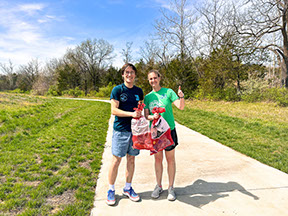 Plogging - Exercise that's good for you and nature
Plogging - Exercise that's good for you and nature
By Rebecca O’Hearn, Stream Team Supervisor
Spring has sprung – bluebells are ringing, morels are popping, and I’m in full crappie fishing mode!
I hope all of you are finding the time to get outside and enjoy what spring has to offer, whether that’s hiking the trails, wandering through the woods, or paddling our streams and lakes. Like many of you, I will have my trash bags handy to pick up litter I encounter while I’m out and about. I recently learned there is a term for this all-so-common activity among Stream Teamers. It’s called plogging!
Plogging is a high-bred word, combining the Swedish words plocka upp (pick up) and jogga (jog). Plogging began as an eco-friendly workout trend in Sweden in 2016. It’s simple – runners pick up any litter they encounter while on a run. Although initially associated with running, it’s now expanded to hiking and walking. And while we are at it, let’s go ahead and throw in rolling! Walking and rolling - that’s something we can all do, even Stream Teamers who don’t own a boat!
The benefits of plogging compound when you consider that just merely being in nature improves your health. Time spent in nature improves your heart rate, blood pressure, and reduces stress. One interesting medical hypothesis for the benefits of plogging is that it fulfills our hunter-gatherer instincts. The theory is that our prehistoric ancestors would have spent considerable time walking long distances while bending over to pick up fruit, nuts, and bugs from the ground to eat.
So, the next time you are out there getting your heart pumping on your local trail or sidewalk, go ahead and add squatting, lunging, and stretching to your workout to pick up those empty bottles, shopping bags, and cigarette butts getting in the way of what should be beautiful scenery. It will benefit your body, mind, and our ecosystems.
Interested in writing a feature article? Email StreamTeam@mdc.mo.gov.
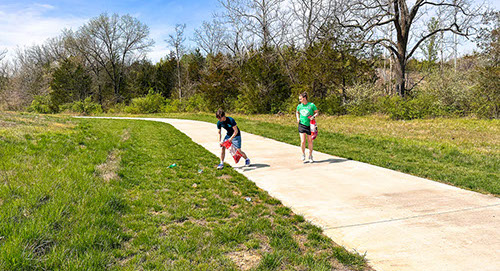
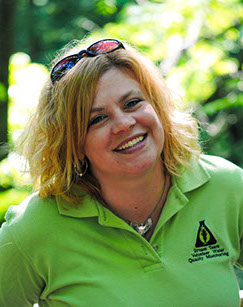 Farewell, Amy Meier
Farewell, Amy Meier
Amy Meier had an incredible 15-year tenure with the Stream Team Program! She touched the lives of many volunteers, and made volunteering easier. She was the first to say yes to any request for assistance from partners and volunteers from lending a hand at a clean-up to giving an educational workshop. Amy strived to have a personal connection with every volunteer in her assigned regions, and took the time to personally respond to activity reports received in her assigned regions. She had a true passion for environmentalism and the grassroots environmental efforts this program supports. Thank you for all your years of service to the Stream Team Program! We wish you well on your next adventure!
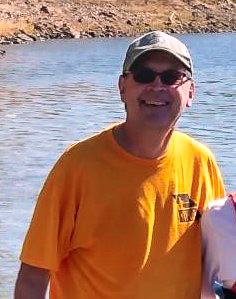 Farewell, Scott Sigman
Farewell, Scott Sigman
We said goodbye to Scott Sigman in January. Scott served as our Kansas City Region Community Education Assistant for over 9 years! Thank you for all your years of dedicated service to Missouri streams!
Welcome, Jacobo Barriga
Hi, my name is Jacobo Barriga and I was born and raised in Kansas City, Missouri. I always had an inclination for venturing through the parks of the city which led me to attain a bachelor’s in Wildlife Conservation and Management at Missouri Western State University in Saint Joseph, Missouri.
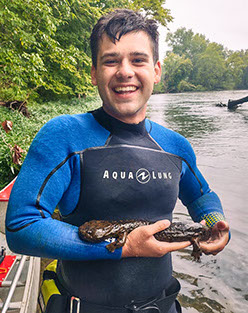
While in school, I took part in my local stream team to monitor a creek on campus and worked a summer with Missouri Department of Conservation (MDC) taking population surveys of hellbenders. I also tried to spend as much time as I could volunteering to do field work with the MDC and the U.S. Fish and Wildlife Service. Most of these opportunities were presented to me through my involvement with the student chapter of The Wildlife Society at my university. Volunteering to me was a good way to not only gain experience, but also that outdoor fix I craved that school and other jobs couldn’t give me. I am excited to take part in a program that engages with volunteers to ensure a better understanding of aquatic ecosystems and their importance in the world.
Jacobo is currently supporting teams in the Kansas City region, and after graduation will be expanding his duties to the Central, Northwest, and Northeast regions.
Updated Program Contacts
We have some fresh faces in the Stream Team Program, and will be gaining two new team members over the next few months. If you are wondering who to contact for help, look no further!
Save the Dates
Watershed Celebration 2023 - July 22, 2023
Join us for the 27th annual Watershed Celebration Picnic at Meramec State Park on July 22nd! This event is hosted by Stream Teams United and Missouri Stream Team Associations to celebrate YOU!
• Free Lunch
• Stream Team Awards
• Learning Stations
• Watershed Bingo
• Raffle including kayak and many more prizes
• Free Stream Team camping at Group Site C on July 21st and July 22nd at Meramec State Park. Check with park for camping info.
PaddleMO 2023! - September 23-27, 2023
Join Stream Teams United with on-water guides Bill and Jody Miles of Earth’s Classroom for fun-filled and educational river excursions. Register for the Missouri River trip in September or the Current River trip in October through PaddleMO.org. Weekend, 3-day, and full 5-day options are available.
Calendar of Events
Wondering how to get started with your new team? Check out our Calendar of Events.
Need help advertising your event? Or struggling to recruit volunteers for a clean-up? We are here to help! Submit a request to advertise through our website calendar, or send an email to StreamTeam@mdc.mo.gov to request an ad through a StreamGram or Facebook post.
2nd Quarter Activity Prize Drawing
2nd Quarter Prizes:
GCI Outdoor Pod Rocker Collapsible Camping Chair
Pelican Intrepid 120 Kayak
Hummingbird Feeder - 20oz
Youth Prize:
Strange but True Book by Missouri Department of Conservation
Fill out an Activity Report for your past or upcoming events, and you could win a prize next quarter!
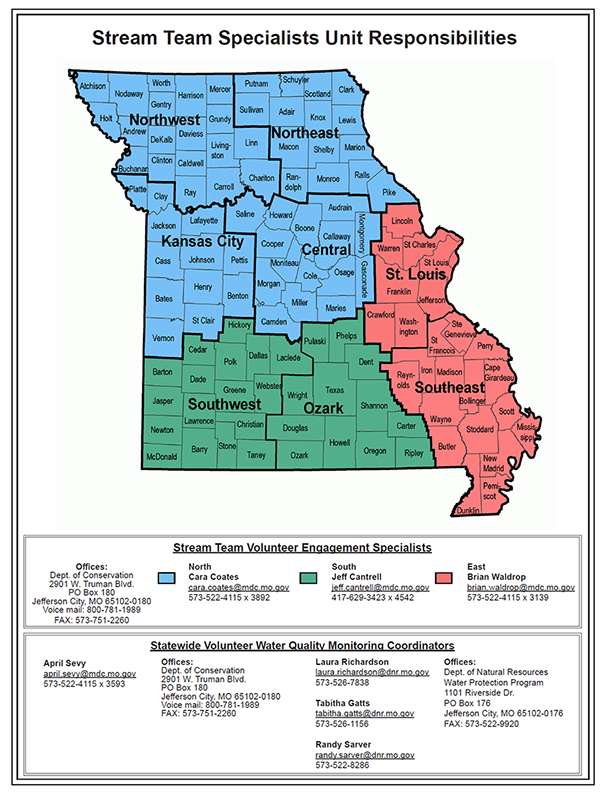
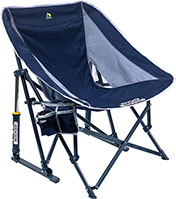


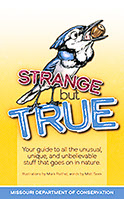
Measuring Dissolved Oxygen
By Randy Sarver, Volunteer Water Quality Monitoring Coordinator & QAQC Officer
The Stream Team Volunteer Water Quality Monitoring Program uses a Modified Winkler Dissolved Oxygen test kit to conduct field analysis of dissolved oxygen in streams. Dissolved oxygen enters water through diffusion from the atmosphere, aeration, and photosynthesis. Cooler water has the capacity to hold more dissolved oxygen, while warmer water has less capacity. Since temperature has an effect on the capacity of water to hold dissolved oxygen, it is also important to measure temperature when measuring dissolved oxygen to determine oxygen saturation. The Missouri Water Quality Standards specify a minimum criterion of 5.0 mg/L for warm water and cool water streams, and 6.0 mg/L for cold water streams.
Besides checking for expired reagents, there are two aspects of using the dissolved oxygen test kit that can commonly affect accurate results. Ensuring that there are no air bubbles in the bottle after inserting the stopper is one aspect. The other is the addition of Sodium Thiosulfate Standard Solution with the dropper. Although adding a “drop” seems straight forward; problems with drop size can affect the results since 1 drop sodium thiosulfate = 1 mg/L dissolved oxygen. To ensure full-size drops, hold the dropper vertically and use firm, quick pressure for each drop. Between drops, release pressure on the bulb and wait for a bubble to rise to the top of the dropper. Practicing a few drops to the side is a good way to check drop size before actually adding them to the sample. Paying attention to these details can help get accurate results.
Since our last issue of Channels, Stream Team members reported:
- 366 total activities
- 1,728 total participants
- 4,633 hours
- 21 tons of trash collected
- 19 water quality monitoring trips
- 114 litter pickups
- and 46 stream teamers picked up new skills at workshops
Check out more highlights below . . .
lpu_20230304_mo_river_franklin_co.jpg?crc=4234232119)
Team 633 – ST#633 collected 16 bags of litter from the
Missouri River in Washington, Missouri.
%2c%20lpu-02202023%2c%20crawford_klein_ford-crop-u15701.jpg?crc=524773395) Team 4706 – ST#4706 collected 10 bags of trash along the upper Meramec River in Crawford County to celebrate President’s Day!
Team 4706 – ST#4706 collected 10 bags of trash along the upper Meramec River in Crawford County to celebrate President’s Day!
wqm_lpu_20221102_gravois_creek_st_louis_county_photo_5-crop-u15707.jpg?crc=3762749553) Team 5221 – ST#5221, the Lindbergh High School Creek Crawlers, were finally able to get back in Gravois Creek for some Water Quality Monitoring after a three-year hiatus!
Team 5221 – ST#5221, the Lindbergh High School Creek Crawlers, were finally able to get back in Gravois Creek for some Water Quality Monitoring after a three-year hiatus!
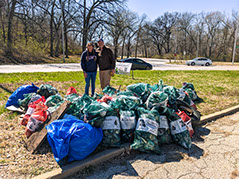 Team 5942 – ST#5942, the Kansas City Zoo, collected 862.2 lbs of trash out of the marsh next to Lakeside Nature Center.
Team 5942 – ST#5942, the Kansas City Zoo, collected 862.2 lbs of trash out of the marsh next to Lakeside Nature Center.
The 100 Club
These are teams that have contributed more than 100 hours since the last issue:
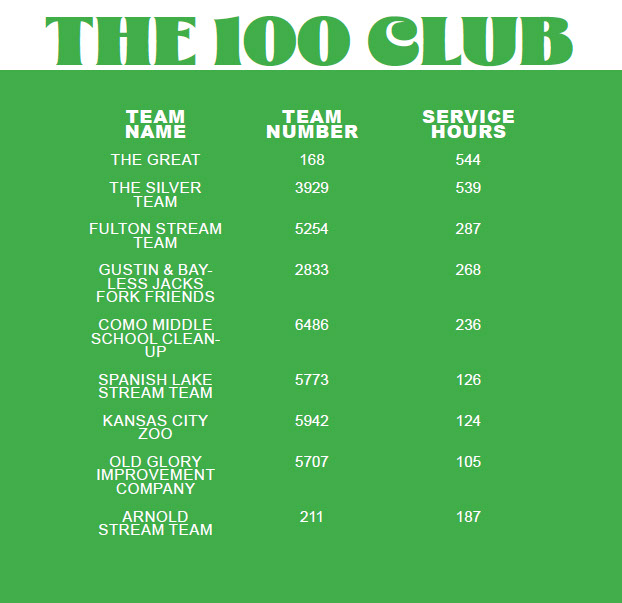
 Stream Teams Converge at the Shoal Creek Confluence Site
Stream Teams Converge at the Shoal Creek Confluence Site
By Mary Culler, Stream Teams United Executive Director
Near the confluence of two streams in southwest Missouri, a stream restoration project is underway. Led by the efforts of the Land Learning Foundation, a nonprofit organization headquartered in Missouri, a collaboration of people, groups, and agencies are working together to restore the ecology of a 35-acre property located at the confluence of Hickory and Shoal Creeks just north of Neosho. Both Hickory and Shoal Creeks are recognized as biologically diverse streams that are regionally important for conservation of habitat and water quality.
The project includes stabilization of an eroding streambank and the planting of trees and shrubs within the riparian corridor and floodplain of the two streams. In November of 2022, over 100 volunteers from the Neosho area, including students, teachers, organizations, and Missouri Stream Teams, came together to plant a diverse mix of over 1,600 trees and shrubs on the property. Over time, as these trees and shrubs grow, the roots of the plants will help stabilize the streambanks, act as natural filters to remove pollutants from stormwater, and help shade and cool the stream. The trees and shrubs will also provide abundant habitat for wildlife and birds.
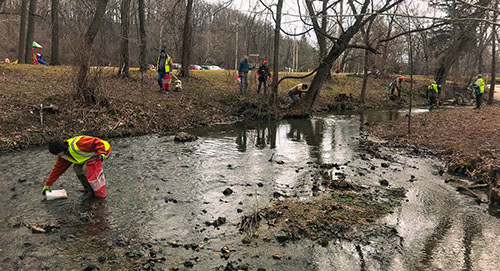
Southwest Missouri Stream Team #5925 led a cleanup of Hickory Creek in Neosho on February 25th this year.
Over 400 square miles of Missouri make up the landscape that contributes water to Shoal Creek. The project also seeks to encourage good soil and water conservation practices and streambank stabilization on land within the Shoal Creek watershed.
Local stream teams, including the Southwest Missouri Stream Team #5925, Neosho High School Wildcats Team #1150, and Neosho high school teachers and students, have been trained in the VWQM protocols and will be helping to monitor the water quality of the streams over time. Local Stream Team leaders, including Tom and Christine Guernsey, who are part of The Clean Water Coalition Team #6080 (a Stream Team Association), have organized several cleanups in the Neosho area and have been tremendous in helping recruit local volunteers to help with the project.
You can learn more about the project at ShoalCreekWatershed.Org, follow the project on Facebook at Shoal Creek Watershed, and join the efforts of the Southwest Missouri Stream Team #5925. Also, a video has been recently created about the project as part of Stream Teams United’s new video series: “Missouri’s Watershed Champions”. We look forward to the continued partnership with the Shoal Creek Watershed Consortium, local Missouri Stream Teams, and residents as the efforts to improve the quality of Shoal Creek continue in southwest Missouri.
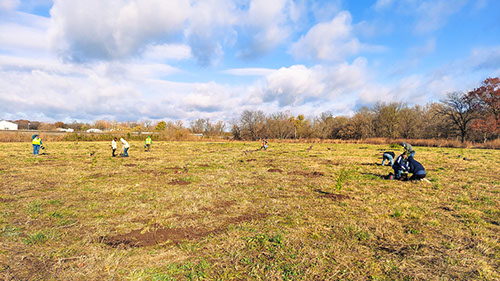
Volunteers, including many Neosho High School Students, planted over 1,600 trees and shrubs at the
confluence site during the first weekend of November 2022.
This project is funded with support from the U.S. Fish and Wildlife Service, National Fish and Wildlife Foundation (grant 1301.21.071600). The views and conclusions contained in this document are those of the authors and should not be interpreted as representing the opinions or policies of the U.S. Government or the National Fish and Wildlife Foundation and its funding sources. Mention of trade names or commercial products does not constitute their endorsement by the U.S. Government, or the National Fish and Wildlife Foundation or its funding sources.
Workshop Highlight: Trip Leader Training & Special Handling Workshop
By Brian Waldrop, St. Louis Stream Team Volunteer Engagement Assistant
The Stream Team Programs’ mission is to provide an opportunity for all citizens to get involved in stream conservation. A common way Stream Teamers get involved is through stream cleanups. There is no training required to host a cleanup, but workshops are offered to help provide guidance and awareness. One such workshop we encourage volunteers who lead clean-up events to attend is the Trip Leader Training and Special Handling Workshop.
Trip Leader Training and Special Handling Workshop began simply as the Trip Leader Training, a workshop created by the Greenway Network in 2014. This workshop teaches volunteers the more straightforward side of putting on and executing a successful cleanup. Stream Team staff members lend a hand to Greenway Network to advertise this workshop, coordinate a training location, and serve as guest speakers as part of the workshop. Each year workshop organizers added more information to keep it updated and informative. The more we learned throughout the cleanup season, the more we had to offer our volunteers.
The Special Handling portion was the turning point in this workshop. Even though you, the volunteers, were finding the unknowns while at cleanups, it was time to connect the correct partners and agencies to deal with them. One important example is the tanks, barrels, and cylinders we too seldom find and who, what, and how to handle them. What about those needles and discarded guns? We teach you the proper steps on that too. What happens when someone cuts themselves or worse? We’ve got you covered. Do you need a 20 or a 40-cubic-yard dumpster? And how many tires can fit in one dumpster, and how clean do they need to be? What about that leaky pipe that is flowing funky green or brown? If these questions arise during cleanup or stream time outings, this workshop is for you.
This year’s workshop was held at Big Muddy National Fish and Wildlife Refuge headquarters in Boonville, MO. Volunteers drove in from up to 170 miles away to attend, while others followed virtually. This highly praised workshop left many still wanting more, which is what we plan on doing. We plan on elevating this workshop by adding an in-field component highlighting pre-scouting, hazardous material spotting, and mapping of the trashy locations. Mark your calendars for the next Trip Leader Training and Special Handling Workshop on February 24, 2024, in Southeast Missouri.
Plogging - Exercise that's good for you and nature
Welcomes and Farewells
Announcements, Save the Dates, and Activity Prizes
Monitoring Minute
Riffle Review
Coalition Corner
Workshop Highlight


Spring 2023